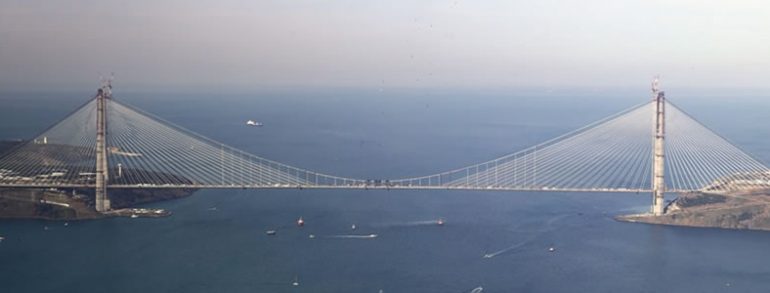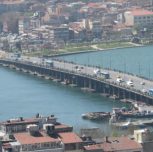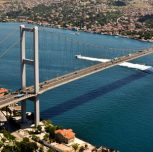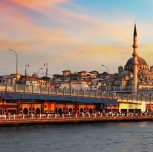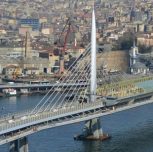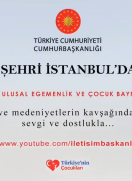The Yavuz Sultan Selim Bridge (Turkish: Yavuz Sultan Selim Köprüsü), initially named the Third Bosphorus Bridge, is a bridge for rail and motor vehicle transit over the Bosphorus, north of two existing bridges in Istanbul, Turkey. The bridge is situated between Garipçe in Sarıyer on the European side and Poyrazköy in Beykoz on the Asian side. The foundation stone laying ceremony was held on 29 May 2013.
At 322 m, the bridge is the tallest suspension bridge in the world. It is, after Millau Viaduct Bridge, the second tallest bridge in the world of any type. The bridge was opened on 26 August 2016. The bridge is also the world’s broadest suspension bridge at 58.4 meters (192 feet) wide.
Project
The bridge is part of the projected 260 km (160 mi) long Northern Marmara Motorway (Turkish: Kuzey Marmara Otoyolu), which will bypass urban areas of Istanbul in the north connecting Kınalı, Silivri in the west and Paşaköy, Hendek in the east. The 58.4 m (192 ft) wide bridge is 2,164 m (7,100 ft) in length with a main span of 1,408 m (4,619 ft).
Designed by Swiss engineer Jean-François Klein (project leader) and by French Michel Virlogeux from T-ingénierie (a Geneva-based company), the bridge is a combined road-rail bridge. It carries four motorway lanes and one railway line in each direction. The construction was carried out by a consortium of the Turkish company İçtaş and the Italian company Astaldi that won the bid on 30 May 2012. The budgeted cost of the bridge's construction was Turkish lira symbol 8x10px.png4.5 billion (approximately US$2.5 billion as of March 2013). The construction was originally expected to be completed in 36 months with the opening date scheduled for the end of 2015. On 29 May 2013 Prime Minister Erdoğan directed the construction management team to finish the construction within 24 months, and projected an opening date for 29 May 2015.
The bridge is world's eighth-longest suspension bridge. The bridge toll is set to be US$3.00 (Turkish lira symbol 8x10px.png9.90) between the motorway exits Odayeri and Paşaköy. It is expected that at least 135,000 vehicles will use the bridge daily in each direction. Minister of Transport and Communication Binali Yıldırım stated that of the total area to be nationalised for the bridge project, 9.57% was private property, 75.24% was forested land, and the remaining 15.19% was already state-owned land.
Construction history
Plans for a third Bosphorous bridge were approved by the Ministry of Transportation in 2012. The construction of the project was awarded to the İçtaş-Astaldi consortium on 29 May 2012.
The construction of the bridge began officially with the foundation stone-laying in a ceremony held on 29 May 2013, the anniversary day of the conquest of Constantinople in 1453. The ceremony was attended by the then State President Abdullah Gül, Prime Minister Recep Tayyip Erdoğan, and numerous high-ranked officials. Erdoğan directed the construction management team to complete construction within 24 months, and set the opening date for 29 May 2015.
Work was temporarily halted in July 2013, when it became evident[according to whom? that the site was mislocated, but only after the removal of thousands of trees. The action, announced in paperwork filed for a plan change written by State Highways Directorate Director-General Mehmet Cahit Turhan on 11 June 2013, reads "it is appropriate to cancel the current construction plan due to the necessity of making a revision, which resulted from changes of the route project". Both the ministry and the construction company have denied any change to the construction site location.
Land prices in the northern, less urbanized areas on both sides of the Bosphorus are already soaring in expectation of an urbanization boom thanks to the new cross-water connection, according to Ekumenopolis, a documentary film of 2010 about the area. The efficacy of the proclaimed goal of easing traffic congestion has been challenged, claiming that the project is little more than a contrivance to open for development lands that had been long protected by law. The green areas and wetlands in question, producing most of the drinking water for the city, are considered by many to be essential for Istanbul's ecological and economic sustainability, and a possible pollution of the groundwater would provoke the collapse of the city. In 1995, Erdoğan, then mayor of Istanbul, declared that a third bridge would mean "the murder of the city".
On 5 April 2014, at about 21:00 local time, a fatal accident occurred during construction work at the link road to the bridge on the Asian side of the Bosphorus near Çavuşbaşı, Beykoz. Three workers were killed and another was injured by falling from a collapsed 50-metre-high (160 ft) scaffolding while concrete was poured at a viaduct.
Naming
The name of the bridge was announced by President Abdullah Gül at the ground-breaking ceremony as the Yavuz Sultan Selim Bridge, in honor of Ottoman Sultan Selim I (c. 1470–1520), who expanded the Ottoman Empire into the Middle East and North Africa in 1514–1517 and obtained the title of Caliph of Islam for the Ottoman dynasty after his conquest of Egypt in 1517.
The choice of name for the bridge has led to protests by Alevis in Turkey because of the role of Sultan Selim I, nicknamed "the Grim" due to his severity in ruling, exemplified by the Ottoman persecution of Alevis. After the Şahkulu Rebellion (1511) in Anatolia, and the Battle of Chaldiran (1514) in northwestern Iran, during which the Qizilbash warriors of the Alevis in eastern Anatolia (who adhere to the Shia sect of Islam) sided with Shah Ismail I of Safavid Persia, the victorious Selim I ordered the massacre of the Qizilbash, whom he considered traitors and heretics (see also Ottoman–Safavid relations and Ottoman–Persian Wars).
Opening ceremony
The opening ceremony on 26 August 2016 was attended by Bulgarian Prime Minister Boyko Borisov, Macedonian President Gjorge Ivanov, the King of Bahrain Hamad bin Isa Al Khalifa and President of the self-declared state of Northern Cyprus Mustafa Akıncı. Speeches were delivered by Turkish President Recep Tayyip Erdoğan and Prime Minister Binali Yıldırım.


